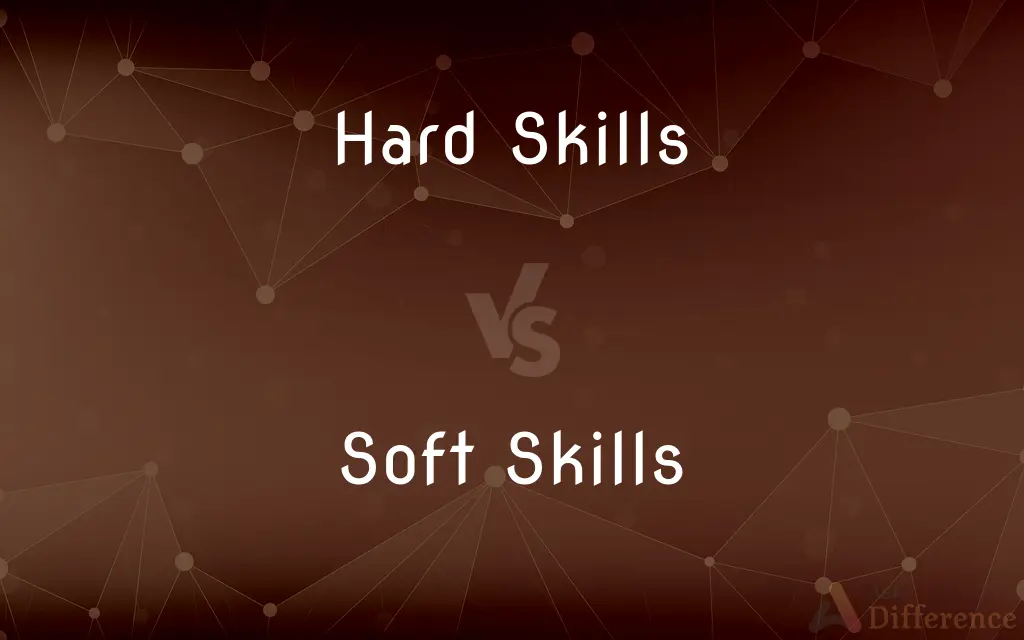Hard Skills vs. Soft Skills — What's the Difference?
By Tayyaba Rehman — Published on October 26, 2023
Hard Skills are specific, teachable, and measurable abilities or knowledge sets, e.g., data analysis. Soft Skills are interpersonal or people skills, affecting one’s ability to interact effectively with others, e.g., communication.

Difference Between Hard Skills and Soft Skills
Table of Contents
ADVERTISEMENT
Key Differences
Hard Skills and Soft Skills are both pivotal in shaping a person’s career, yet they represent different aspects of a professional’s repertoire. Hard Skills refer to technical knowledge or training that you have gained through any life experience. Conversely, Soft Skills revolve around interactions and the management of relationships within a work setting.
In the employment sector, Hard Skills often become the preliminary check, while Soft Skills can become the scale to weigh one candidate over another. Hard Skills provide a foundation, ensuring that candidates have the basic abilities needed to perform specific tasks. Meanwhile, Soft Skills ensure that an individual can exist harmoniously within an organizational culture and communicate effectively with colleagues.
Education typically focuses on Hard Skills, offering training and learning opportunities to develop expertise in a specific area. Soft Skills, while sometimes overseen in formal education, can sometimes be the determining factor in hiring and advancement decisions within a company.
A symbiotic relationship often exists between Hard Skills and Soft Skills. Mastery of Hard Skills may offer clear, tangible benefits in job performance, but without the Soft Skills necessary to work in a team or resolve conflicts, an employee may find advancement limited.
Employers generally seek a blend of Hard Skills and Soft Skills while hiring, as they collectively ensure that a candidate can perform tasks and also fit well within the team and organizational culture. Hard Skills often get you in the door, but Soft Skills ensure you can navigate the environment effectively once you’re there.
ADVERTISEMENT
Comparison Chart
Definition
Specific, teachable abilities or skills
Interpersonal and communication skills
Measurement
Easily measured and quantified
Difficult to measure
Acquisition
Through education and training
Developed through personal experiences
Evaluation
Tests, certifications
Behavioral observations
Example
Data analysis, machinery operation
Leadership, empathy
Compare with Definitions
Hard Skills
Hard Skills are industry-specific skills that are key to job performance.
Her Hard Skills in molecular biology enabled groundbreaking research in genetics.
Soft Skills
Soft Skills can significantly impact collaboration and teamwork.
Her Soft Skills fostered a spirit of collaboration and unity among diverse team members.
Hard Skills
Hard Skills refer to the technical knowledge or abilities required to perform specific tasks.
His impressive Hard Skills in coding helped him develop a revolutionary app.
Soft Skills
Soft Skills pertain to how individuals interact, communicate, and relate with others.
His Soft Skills helped resolve a heated argument between team members.
Hard Skills
Hard Skills can be explicitly tested and certified.
He acquired several certifications that demonstrated his Hard Skills in network security.
Soft Skills
Soft Skills involve emotional intelligence and empathy towards others.
His Soft Skills enabled him to understand and address his team's concerns effectively.
Hard Skills
Hard Skills often refer to the use of tools, machinery, or technology.
His Hard Skills in using the printing machinery ensured the smooth operation of the press.
Soft Skills
Soft Skills often facilitate conflict resolution and problem-solving in a social context.
His Soft Skills were crucial in diplomatically navigating through client complaints and ensuring satisfaction.
Hard Skills
Hard Skills are quantifiable, often acquired through training or education.
Her Hard Skills in accounting were crucial for the company’s financial management.
Soft Skills
Soft Skills are usually self-developed, intangible, and challenging to quantify.
Her Soft Skills in leadership facilitated a positive and productive work environment.
Common Curiosities
What are Hard Skills?
Hard Skills are specific, teachable abilities or knowledge sets, such as data analysis or machinery operation.
How are Soft Skills different from Hard Skills?
Soft Skills are interpersonal or people skills, affecting one’s ability to interact effectively with others, whereas Hard Skills are specific, measurable abilities.
Are Soft Skills crucial for leadership roles?
Yes, Soft Skills, like communication and leadership, are vital for managing teams effectively.
Can Hard Skills be easily measured?
Yes, Hard Skills are quantifiable and can be measured through tests and certifications.
How are Hard Skills usually acquired?
Hard Skills are typically acquired through education, training, and practice.
Why are Soft Skills important in the workplace?
Soft Skills enhance interpersonal relationships, communication, and overall harmony in the workplace.
Can Hard Skills be included in a resume?
Yes, Hard Skills are often listed in a resume to showcase specific abilities and proficiencies.
Do Soft Skills contribute to customer satisfaction?
Absolutely, Soft Skills like empathy and communication play a pivotal role in customer interaction and satisfaction.
Can Hard Skills be self-taught?
Yes, Hard Skills can be self-taught through resources like books, online courses, and hands-on practice.
How can Soft Skills impact career growth?
Soft Skills can impact career growth by improving relationships, enhancing leadership capabilities, and aiding in conflict resolution.
Are Hard Skills industry-specific?
Often, Hard Skills are industry-specific, like knowledge of programming languages in IT or financial modeling in finance.
Can Soft Skills be developed over time?
Yes, Soft Skills can be developed and refined through experiences, mindful practice, and feedback.
Are Soft Skills inherently present, or can they be developed?
While some people may naturally possess certain Soft Skills, they can certainly be developed and refined through conscious effort.
How do employers assess Hard Skills during recruitment?
Employers often assess Hard Skills through tests, assignments, certifications, and reviewing past projects.
Can a balance of Hard Skills and Soft Skills enhance job performance?
Yes, a balance of Hard Skills and Soft Skills ensures both task proficiency and effective interpersonal interactions, enhancing job performance.
Share Your Discovery

Previous Comparison
Zinc Citrate vs. Zinc Gluconate
Next Comparison
Accelerometer vs. PedometerAuthor Spotlight
Written by
Tayyaba RehmanTayyaba Rehman is a distinguished writer, currently serving as a primary contributor to askdifference.com. As a researcher in semantics and etymology, Tayyaba's passion for the complexity of languages and their distinctions has found a perfect home on the platform. Tayyaba delves into the intricacies of language, distinguishing between commonly confused words and phrases, thereby providing clarity for readers worldwide.
















































